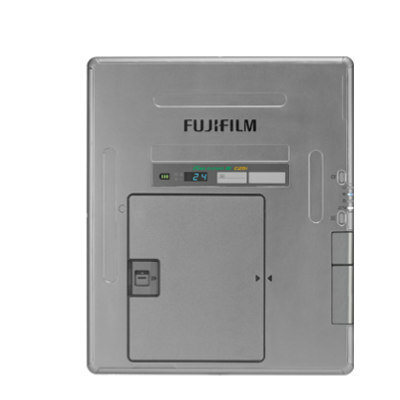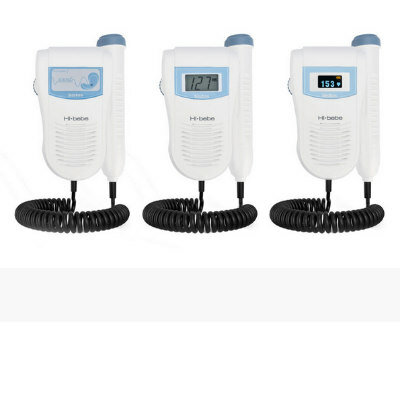Fujifilm Showcases New DR Detectors and AI Initiative in Chicago
|
By Theresa Herman, Regional Director Posted on 26 Nov 2018 |

Image: Fujifilm unveiled two new DR detectors at the RSNA annual meeting in Chicago (Photo courtesy of Fujifilm Medical Systems).
Fujifilm Medical Systems U.S.A, Inc, (Stamford, CT, USA), a provider of diagnostic imaging and medical informatics solutions, unveiled two new digital radiography (DR) detectors – the CALNEO Dual (available only in Japan) and the FDR ES – at the 2018 Radiological Society of North America (RSNA) annual meeting, November 25-30 in Chicago, Ill., USA. The company also presented, REiLI, its global Medical Imaging and Informatics Artificial Intelligence (AI) technology initiative, as well as hosted an educational symposium focusing on the impact of AI on enterprise imaging now and into the future.
The CALNEO Dual is a 17-inch x 17-inch standard cassette sized detector featuring two sensitivity capture layers, coupled with Fujifilm intelligent energy subtraction processing. A single exposure produces three images; traditional, soft tissue only and bone only views. These distinctly different images can be utilized for visualizing or tracking of lung cancer nodules. The innovative dual capture layer design yields higher definition general X-ray images, enhancing separation accuracy of bone detail and soft tissue.
Fujifilm’s new FDR ES detector is a next-generation X-ray room retrofit solution designed with the essential conveniences of Fujifilm DR image acquisition innovations. The light, portable detectors are packed with all the benefits of Fujifilm's high sensitivity detector technologies and the latest refinements in image processing. Optimized for existing X-ray room equipment, these detectors feature simplified integration for a more affordable DR retrofit without sacrificing dose, workflow and image quality performance. In addition to these latest and most advanced detectors, Fujifilm also showcased its comprehensive line of DR detectors and mobile DR solutions to suit the needs of large as well as small imaging facilities. At RSNA 2018, the company offered a glimpse into the future of DR detector technologies with an under the cover, inside view prototype display.
"Once again, Fujifilm is pushing the limits, expanding the capabilities of digital radiography," said Johann Fernando, Ph.D., CEO of FUJIFILM Medical Systems U.S.A, Inc. "Our latest advances with the CALNEO Dual represent a transformation in image capture technologies that will allow clinicians to visualize more detail than before and from a single exposure."
At RSNA 2018, Fujifilm also featured dedicated workstations demonstrating AI platform use cases within Synapse 5 PACS driven by REiLI. Under the REiLI brand, Fujifilm is developing AI technologies that strongly support diagnostic imaging workflow, leveraging the combination of deep learning in its AI technology with the company’s image processing heritage.
Applications currently in development include Region Recognition, an AI technology to accurately recognize and consistently extract organ regions, regardless of deviations in shape, presence or absence of disease, and imaging conditions; Computer Aided Detection, an AI technology to reduce the time of image interpretation and support radiologists’ clinical decision making; Workflow Support, using AI technology to realize optimal study prioritization, alert communications of AI findings, and report population automation.
“Our goal is to provide an open platform which manages the workflow and delivery of AI technologies through Synapse clinical applications enabled for AI results and use cases, and realize a new and more powerful diagnostic workflow that advances the field of radiology,” said Bill Lacy, Vice President of Medical Informatics at FUJIFILM Medical Systems, U.S.A, Inc.
The CALNEO Dual is a 17-inch x 17-inch standard cassette sized detector featuring two sensitivity capture layers, coupled with Fujifilm intelligent energy subtraction processing. A single exposure produces three images; traditional, soft tissue only and bone only views. These distinctly different images can be utilized for visualizing or tracking of lung cancer nodules. The innovative dual capture layer design yields higher definition general X-ray images, enhancing separation accuracy of bone detail and soft tissue.
Fujifilm’s new FDR ES detector is a next-generation X-ray room retrofit solution designed with the essential conveniences of Fujifilm DR image acquisition innovations. The light, portable detectors are packed with all the benefits of Fujifilm's high sensitivity detector technologies and the latest refinements in image processing. Optimized for existing X-ray room equipment, these detectors feature simplified integration for a more affordable DR retrofit without sacrificing dose, workflow and image quality performance. In addition to these latest and most advanced detectors, Fujifilm also showcased its comprehensive line of DR detectors and mobile DR solutions to suit the needs of large as well as small imaging facilities. At RSNA 2018, the company offered a glimpse into the future of DR detector technologies with an under the cover, inside view prototype display.
"Once again, Fujifilm is pushing the limits, expanding the capabilities of digital radiography," said Johann Fernando, Ph.D., CEO of FUJIFILM Medical Systems U.S.A, Inc. "Our latest advances with the CALNEO Dual represent a transformation in image capture technologies that will allow clinicians to visualize more detail than before and from a single exposure."
At RSNA 2018, Fujifilm also featured dedicated workstations demonstrating AI platform use cases within Synapse 5 PACS driven by REiLI. Under the REiLI brand, Fujifilm is developing AI technologies that strongly support diagnostic imaging workflow, leveraging the combination of deep learning in its AI technology with the company’s image processing heritage.
Applications currently in development include Region Recognition, an AI technology to accurately recognize and consistently extract organ regions, regardless of deviations in shape, presence or absence of disease, and imaging conditions; Computer Aided Detection, an AI technology to reduce the time of image interpretation and support radiologists’ clinical decision making; Workflow Support, using AI technology to realize optimal study prioritization, alert communications of AI findings, and report population automation.
“Our goal is to provide an open platform which manages the workflow and delivery of AI technologies through Synapse clinical applications enabled for AI results and use cases, and realize a new and more powerful diagnostic workflow that advances the field of radiology,” said Bill Lacy, Vice President of Medical Informatics at FUJIFILM Medical Systems, U.S.A, Inc.
Latest RSNA 2018 News
- New AI-Powered Lung Imaging Solution Launched at RSNA 2018
- Agfa Brings Intelligent Radiography to RSNA 2018
- Carestream Displays Several IT Offerings at Radiology Congress
- Double Black Imaging Announces Expanded Clinical LCD Line at Trade Show
- Lunit Unveils AI-Based Mammography Solution at RSNA 2018
- Guerbet Showcases Ongoing Collaboration with IBM Watson at Radiology Trade Fair
- M*Modal Launches Cloud-Based Version of AI-Powered Reporting Solution
- MDW Unveils First Radiology Blockchain Platform at RSNA 2018
- Teledyne DALSA Displays Xineos Family of CMOS X-ray Detectors
- SuperSonic Imagine Showcases New Ultrasound System at RSNA 2018
- CIVCO Medical Solutions Introduces Next-Generation of Ultrasound Accessories
- Subtle Medical Showcases Al for PET and MRI Scans at RSNA 2018
- Philips Launches New Platform to Enable Development of AI Assets
Channels
Radiography
view channel
Novel Breast Imaging System Proves As Effective As Mammography
Breast cancer remains the most frequently diagnosed cancer among women. It is projected that one in eight women will be diagnosed with breast cancer during her lifetime, and one in 42 women who turn 50... Read more
AI Assistance Improves Breast-Cancer Screening by Reducing False Positives
Radiologists typically detect one case of cancer for every 200 mammograms reviewed. However, these evaluations often result in false positives, leading to unnecessary patient recalls for additional testing,... Read moreMRI
view channel
World's First Sensor Detects Errors in MRI Scans Using Laser Light and Gas
MRI scanners are daily tools for doctors and healthcare professionals, providing unparalleled 3D imaging of the brain, vital organs, and soft tissues, far surpassing other imaging technologies in quality.... Read more
Diamond Dust Could Offer New Contrast Agent Option for Future MRI Scans
Gadolinium, a heavy metal used for over three decades as a contrast agent in medical imaging, enhances the clarity of MRI scans by highlighting affected areas. Despite its utility, gadolinium not only... Read more.jpg)
Combining MRI with PSA Testing Improves Clinical Outcomes for Prostate Cancer Patients
Prostate cancer is a leading health concern globally, consistently being one of the most common types of cancer among men and a major cause of cancer-related deaths. In the United States, it is the most... Read moreUltrasound
view channel
Largest Model Trained On Echocardiography Images Assesses Heart Structure and Function
Foundation models represent an exciting frontier in generative artificial intelligence (AI), yet many lack the specialized medical data needed to make them applicable in healthcare settings.... Read more.jpg)
Groundbreaking Technology Enables Precise, Automatic Measurement of Peripheral Blood Vessels
The current standard of care of using angiographic information is often inadequate for accurately assessing vessel size in the estimated 20 million people in the U.S. who suffer from peripheral vascular disease.... Read more
Deep Learning Advances Super-Resolution Ultrasound Imaging
Ultrasound localization microscopy (ULM) is an advanced imaging technique that offers high-resolution visualization of microvascular structures. It employs microbubbles, FDA-approved contrast agents, injected... Read more
Novel Ultrasound-Launched Targeted Nanoparticle Eliminates Biofilm and Bacterial Infection
Biofilms, formed by bacteria aggregating into dense communities for protection against harsh environmental conditions, are a significant contributor to various infectious diseases. Biofilms frequently... Read moreNuclear Medicine
view channel
New Imaging Technique Monitors Inflammation Disorders without Radiation Exposure
Imaging inflammation using traditional radiological techniques presents significant challenges, including radiation exposure, poor image quality, high costs, and invasive procedures. Now, new contrast... Read more
New SPECT/CT Technique Could Change Imaging Practices and Increase Patient Access
The development of lead-212 (212Pb)-PSMA–based targeted alpha therapy (TAT) is garnering significant interest in treating patients with metastatic castration-resistant prostate cancer. The imaging of 212Pb,... Read moreNew Radiotheranostic System Detects and Treats Ovarian Cancer Noninvasively
Ovarian cancer is the most lethal gynecological cancer, with less than a 30% five-year survival rate for those diagnosed in late stages. Despite surgery and platinum-based chemotherapy being the standard... Read more
AI System Automatically and Reliably Detects Cardiac Amyloidosis Using Scintigraphy Imaging
Cardiac amyloidosis, a condition characterized by the buildup of abnormal protein deposits (amyloids) in the heart muscle, severely affects heart function and can lead to heart failure or death without... Read moreGeneral/Advanced Imaging
view channel
PET Scans Reveal Hidden Inflammation in Multiple Sclerosis Patients
A key challenge for clinicians treating patients with multiple sclerosis (MS) is that after a certain amount of time, they continue to worsen even though their MRIs show no change. A new study has now... Read more
Artificial Intelligence Evaluates Cardiovascular Risk from CT Scans
Chest computed tomography (CT) is a common diagnostic tool, with approximately 15 million scans conducted each year in the United States, though many are underutilized or not fully explored.... Read more
New AI Method Captures Uncertainty in Medical Images
In the field of biomedicine, segmentation is the process of annotating pixels from an important structure in medical images, such as organs or cells. Artificial Intelligence (AI) models are utilized to... Read more.jpg)
CT Coronary Angiography Reduces Need for Invasive Tests to Diagnose Coronary Artery Disease
Coronary artery disease (CAD), one of the leading causes of death worldwide, involves the narrowing of coronary arteries due to atherosclerosis, resulting in insufficient blood flow to the heart muscle.... Read moreImaging IT
view channel
New Google Cloud Medical Imaging Suite Makes Imaging Healthcare Data More Accessible
Medical imaging is a critical tool used to diagnose patients, and there are billions of medical images scanned globally each year. Imaging data accounts for about 90% of all healthcare data1 and, until... Read more
Global AI in Medical Diagnostics Market to Be Driven by Demand for Image Recognition in Radiology
The global artificial intelligence (AI) in medical diagnostics market is expanding with early disease detection being one of its key applications and image recognition becoming a compelling consumer proposition... Read moreIndustry News
view channel
Hologic Acquires UK-Based Breast Surgical Guidance Company Endomagnetics Ltd.
Hologic, Inc. (Marlborough, MA, USA) has entered into a definitive agreement to acquire Endomagnetics Ltd. (Cambridge, UK), a privately held developer of breast cancer surgery technologies, for approximately... Read more
Bayer and Google Partner on New AI Product for Radiologists
Medical imaging data comprises around 90% of all healthcare data, and it is a highly complex and rich clinical data modality and serves as a vital tool for diagnosing patients. Each year, billions of medical... Read more


















